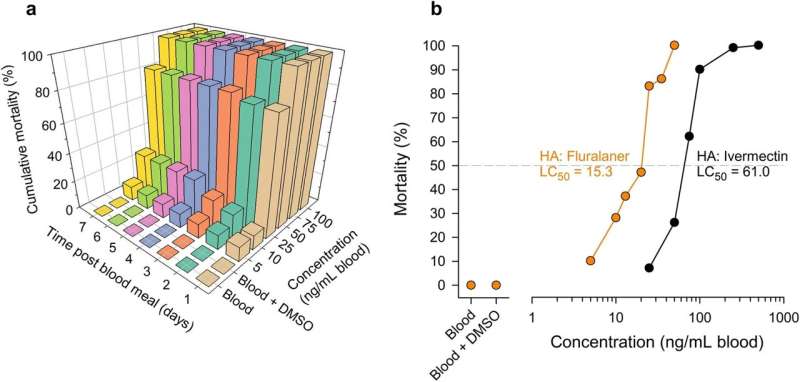Common veterinary drugs show effectiveness against bed bugs

Two common drugs used by veterinarians to combat parasites may be effective against bed bugs, with one showing especially strong potential, according to a new study from North Carolina State University that examined the drugs in the context of controlling resurgent bed bug populations on poultry farms.
Fluralaner and ivermectin, which are used to kill fleas and ticks on household pets like dogs and cats, among other uses, were tested for their effectiveness in killing bed bugs. In a collaboration between entomologists and veterinary scientists from NC State's College of Veterinary Medicine, researchers tested bed bug mortality rates in different experiments: after the pests consumed blood mixed with the drugs on the lab bench and after bed bugs bit and fed off chickens that had either ingested or received topical treatment with the drugs.
Fluralaner is a relatively new, longer-lasting anti-parasitic drug used mostly for companion animals; however, Europe and Australia have approved its use for the poultry industry. Besides household pet uses, ivermectin effectively serves anti-parasitic uses in human populations, particularly in Africa, as well as in larger animals.
Both drugs showed powerful efficacy on the lab bench, killing most bed bugs, although fluralaner performed much more effectively on bed bugs that showed resistance to common insecticides.
"The drugs affect receptors in the insect's nervous system," said Coby Schal, Blanton J. Whitmire Distinguished Professor of Entomology at NC State and the corresponding author of a paper describing the work.
Fluralener was highly effective at killing bed bugs that fed on chickens dosed with the drug. Ivermectin, meanwhile, was ineffective against bed bugs that fed on dosed chickens.
"We used the recommended dosage of ivermectin, either in a topical form or ingested, but neither was able to kill bed bugs," said Maria González-Morales, a former Ph.D. student at NC State and the first author of the paper.
The researchers say that chickens could be quickly metabolizing or clearing ivermectin from their systems.
"The bed bug is a globally important insect," Schal said. "The last few decades have seen a resurgence of bed bugs in homes, and now we're seeing bed bugs return to poultry farms. Since there is no proven method to stop bed bugs in commercial farms, the potential problems on poultry farms could be massive. We're trying to get ahead of it by developing technologies that can eliminate bed bugs."
"The health effects to poultry from bed bug infestation are not well documented, but anecdotally poultry farmers see animal welfare concerns like stress and anemia, which could negatively affect meat or egg production," González-Morales said.
"There are also concerns for workers on these farms considering how easily bed bugs can spread from poultry to people," Schal added.
The researchers say that dosing fluralaner in poultry drinking water could serve as an effective measure against bed bugs. A combination of monitoring, education, heat treatments and fluralaner could hold the key to eradicating bed bugs from infested poultry farms, they add.
The study appears in Parasites & Vectors.
More information: Maria A. González-Morales et al, Systemic veterinary drugs for control of the common bed bug, Cimex lectularius, in poultry farms, Parasites & Vectors (2022). DOI: 10.1186/s13071-022-05555-6
Provided by North Carolina State University




















